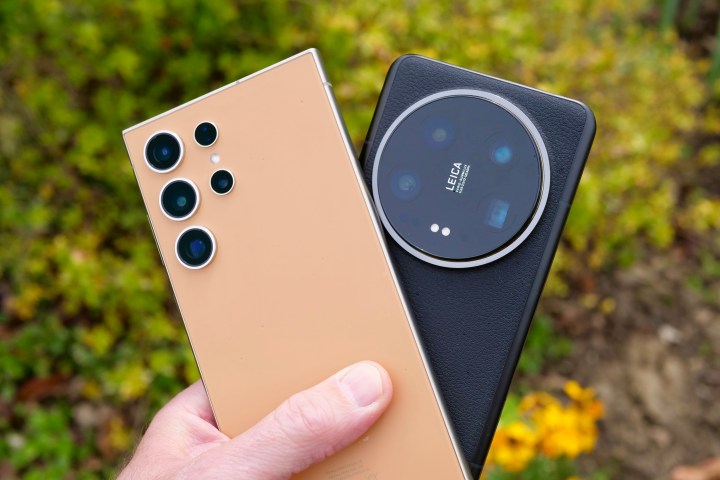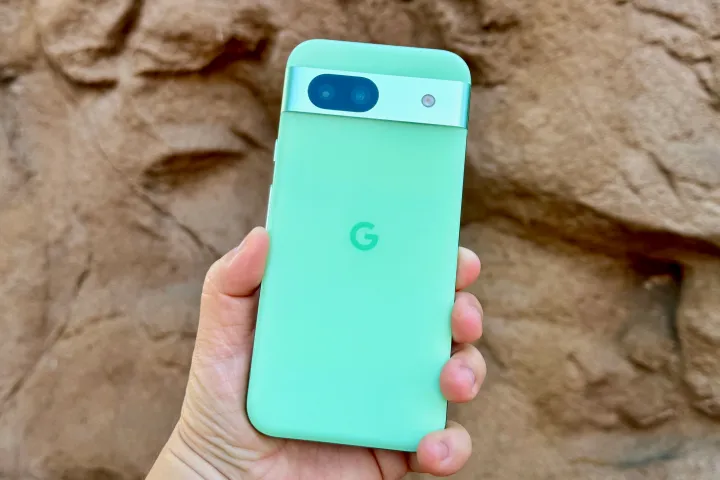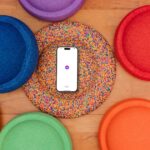
In the past decade or so, cameras on smartphones have evolved so much that they can pretty much replace a standalone digital camera for most people. The results you can get on some of the best smartphones these days are just so impressive, and being able to be with you at all times means you’ll never miss a moment.
But what if you want the best possible camera phone money can buy? A camera that won’t let you down no matter what you’re taking a picture of? You’ve come to the right place. Here are the very best camera phones you can buy in 2024.

Xiaomi 14 Ultra
The best camera phone
Pros
- It can take incredible photos
- So many camera modes to try
- Smooth and reliable software
- Fast battery charging
Cons
- Battery life falls short of the competition
- Ungainly shape
Why should you buy this: It has the absolute best camera you can get on a smartphone thanks to the Leica partnership.
Who’s it for: Those who take mobile photography very seriously.
Why we picked the Xiaomi 14 Ultra:
The main strength of the Xiaomi 14 Ultra is the camera. It uses a Sony LYT-900 1-inch, 50MP main camera that also has a Leica Summilux lens and an adjustable aperture (f/1.63 to f/4.0), as well as a 50MP telephoto camera, 50MP ultrawide camera, and a 50MP periscope zoom camera. That’s a lot of cameras!
This phone also uses Xiaomi’s new AISP imaging system that features AI to help tune various aspects in your photos. These aspects include the color of each pixel to the lighting and even bokeh effects in your photos.
And then there’s the other Leica involvement, besides the lens. It has Leica tones, filters, and even a dedicated street photography mode. You also have 16-bit UltraRAW photo mode for professionals, long-exposure modes, and even MasterCinema video modes for budding filmmakers.
Again, the biggest strength of the Xiaomi 14 Ultra is the camera. You won’t get bored of experimenting with this phone for ages when it comes to photo and video. But the rest of the phone is your typical Android phone, which matches up with the other modern day options like Samsung Galaxy S24 Ultra and Google Pixel 8 Pro. But the camera on the Xiaomi 14 Ultra far surpasses them in almost every way.
The other problem? The Xiaomi 14 Ultra isn’t available in the U.S., so you’ll have to import it. And it doesn’t come cheap with a starting price of around $1,640. But there’s no doubt about it — this is the best smartphone camera out there.

Xiaomi 14 Ultra
The best camera phone

Google Pixel 9 Pro
The best camera phone runner-up
Pros
- Beautiful hardware and display
- Compact size without compromises
- It’s pink!
- Long battery life
- Great cameras
- Mostly good AI tools
- Seven years of updates
Cons
- Slow charging speeds
- 128GB base storage
Why should you buy this: It has the best all-round camera you can buy in the U.S. and many markets around the world.
Who’s it for: Those who want a great all-around camera without needing to import it.
Why we picked the Google Pixel 9 Pro:
The Google Pixel 9 Pro doesn’t have the best camera on this list, but it does have the best all-around camera you can buy on a smartphone in the U.S. The wide availability and local warranty mean this is probably the best pick for most people over our best overall pick.
The Pixel 9 Pro uses a 1/1.31-inch, 50MP main camera that has an f/1.68 aperture lens with an 82° field of view. This is paired with a 48MP ultrawide camera with f/1.7 aperture and 123° field of view and a 48MP periscope zoom camera with upgraded sensor and f/2.8 aperture that offers 5x optical zoom. Many of the improvements in the Pixel 9 Pro come from Google’s algorithm changes and a new HDR+ imaging pipeline that promises to better capture shadows, textures and skin tones.
There are also plenty of AI features that are designed to help make the most from this excellent camera package. Super Res Zoom and Video Boost allow you to zoom further than before, and enhance the quality of the final video.
Add Me uses AI to help you capture photos that has everyone in the shot, including the photographer. Reimagine allows you to change photos by adding or removing people or objects in Magic Editor after you’ve taken the photo. Auto Frame uses AI to guide you to better frame a photo after you’ve already captured it. Zoom Enhance allows you to zoom in and then uses AI to fill in the high-quality details that may be missing.
The magic of the Pixel 9 Pro is Google’s ability to achieve outsize results using software and AI, whereas its competitors rely on physical hardware. Like the Pixel 8 Pro and other Pixel phones that came before it, the Pixel 9 Pro proves once again that it’s not the hardware that matters, but the software and color science that is paired with it.

Google Pixel 9 Pro
The best camera phone runner-up

Samsung Galaxy S24 Ultra
The best versatile camera phone
Pros
- High performance processor
- Improved telephoto cameras
- Flatter screen aids S Pen use
- Battery will last two days
- Long software support
- Durable build and materials
- Circle to Search by Google
Cons
- Unfortunate price increase
- Speakers easily covered up
- Chat Assist is almost unusable
- Charging speeds are only average
Why should you buy this: This powerful smartphone will last you for years.
Who’s it for: If you seek a phone camera that is incredible versatile, the lenses on the Galaxy S24 Ultra deliver.
Why we picked the Samsung Galaxy S24 Ultra:
Just like its predecessor, the Galaxy S24 Ultra has a 200MP main camera, 12MP ultrawide camera, and a 10MP telephoto camera for 3x optical zoom. There’s also a new 50MP telephoto camera for 5x optical zoom and 10x “optical quality” zoom. This range of lenses and possible focal lengths make this the most versatile smartphone camera on this list. Though it is a step down from the S23 Ultra’s 10x optical zoom capability, the S24 Ultra is still a mighty fine smartphone camera.
On the inside, the S24 Ultra has Samsung’s ProVisual Engine, Super HDR, and some new magical AI tools that will further enhance your photos after taking them.
As found in our review and camera comparison with the S23 Ultra, the S24 Ultra takes fantastic photos. Though the 10x photos will have slightly less detail, the S24 Ultra takes better, more colorful photos that are also more visually accurate than its predecessor.
There’s also a new AI-assisted slow-motion mode for video. This lets you tap and hold on a normal speed video recording, and the S24 Ultra will slow it down while using AI to fill in missing frames. Other cool features include UHD resolution recording with access to all zoom levels, 8K at 30fps recording, UHD slow motion video at 120fps.
With the Snapdragon 8 Gen 3 for Galaxy chipset, taking photos and video is very fast, and the rest of the phone’s performance holds up well too. And the integrated S Pen also means you can use it as a remote shutter. There’s a lot to like about the S24 Ultra, but the camera is one of the best reasons to buy it.

Samsung Galaxy S24 Ultra
The best versatile camera phone

Apple iPhone 16 Pro
The best iPhone camera for Pro users
Pros
- Beautiful display
- Powerful performance
- Camera Control is a nice addition
- Great battery life
- Improved ultrawide camera
Cons
- It’s too darn big
- Boring colors
- Apple Intelligence not available yet
Why should you buy this: The Apple iPhone 16 Pro is an amazing all-around smartphone and it includes the best camera on an iPhone.
Who’s it for: People who want an iPhone with the best camera.
Why we picked the iPhone 16 Pro:
Unlike in previous years, the iPhone 16 Pro delivers the same great camera as the iPhone 16 Pro Max, but in a smaller body. There are many similarities with the iPhone 15 Pro Max, but an upgraded 48MP ultrawide camera and new Camera Control tricks make for a better all-around camera experience.
Photos captured with the main 48MP Fusion camera default to 24MP resolution, which means your photos will have more detail than previous iPhones. The iPhone 16 Pro has the same 5x telephoto lens found on the iPhone 15 Pro Max, which is a big improvement over the 3x telephoto found in the iPhone 15 Pro, while the 48MP ultrawide camera enables better macro photography.
The iPhone 16 Pro also comes with Apple’s new Photographic Styles. They work similar to Instagram filters, and allow you to individually change the tone and color of your photos to achieve the perfect look. Previously, you had to choose the filter and look before you took the photo, but the iPhone 16 camera allows you to capture this after the you’ve taken it.
Exclusive to the iPhone 16 Pro and iPhone 16 Pro Max is Apple ProRAW shooting and night mode portraits, while for those who record videos, there’s 4K Dolby Vision video recording at 120fps, ProRes and Log video recording, and a four-mic setup. Unlike previous years, there are fewer differences between the non-Pro and Pro phones, so unless you need the telephoto camera and improved ultrawide sensor, the iPhone 16 and iPhone 16 Plus are probably better picks.
The iPhone 16 Pro is powered by the new A18 Pro chipset, which is based on TSMC’s 3nm process. It’s designed with Apple Intelligence in mind, and offers significant improvements in AI performance over previous chipsets.

Apple iPhone 16 Pro
The best iPhone camera for Pro users

Apple iPhone 16
The best iPhone camera for most people
Pros
- Fun, refreshing new design
- Stunning colors this year
- Camera Control is so, so good
- The Action button rules
- Excellent camera system
- Reliable battery life
Cons
- 60Hz display, no always-on display
- Slow charging speeds
- Apple Intelligence not yet available
Why should you buy this: The Apple iPhone 16 offers the best non-Pro camera ever on an iPhone.
Who’s it for: Anyone who wants an iPhone camera, but doesn’t need a telephoto lens.
Why we picked the iPhone 16:
The non-Pro iPhone has always had many compromises, not least in the camera, but this year, those compromises are fewer than ever before. It’s the best non-Pro iPhone camera ever made, and the upgrades mean that this is likely the best iPhone camera for most people.
Apple gave the base model iPhone 16 some major upgrades in the camera, including the new 48MP Fusion camera and an upgraded ultrawide camera with the same 12MP resolution. The ultrawide camera gains autofocus, and this enables Macro photography on a non-Pro iPhone for the first time. The new 48MP Fusion camera captures photos at 24MP resolution, and enables a new 2x telephoto option — achieved by cropping the middle of the sensor — that offers a faster aperture than any previous dedicated 2x telephoto on an iPhone.
The camera upgrades also mean that the iPhone 16 and iPhone 16 Plus can capture spatial photos and videos to use with the Apple Vision Pro. The base model iPhone 16 also has a Camera Control button, including the same features as the iPhone 16 Pro, and will gain access to Vision Intelligence when it launches later this year. The base iPhone 16 models — as well as the Pro phones — also gains access to Audio Mix, which allows you to adjust the sound captured in a video with different effects.
The iPhone 16 is powered by the A18 processor, marking the first time that Apple’s base mode iPhone has been powered by a chipset of the same generation as its Pro siblings. The six-core CPU features two performance cores and four efficiency cores, and is designed to be up to twice as fast for on-device machine learning. CPU performance has been increased by up to 30%, while the desktop-class five-core GPU is up to 40% faster than the iPhone 15.
For the first time, the non-Pro iPhone delivers a nearly identical camera experience to its Pro siblings. If you don’t need a telephoto lens or an improved ultrawide camera, the iPhone 16 delivers the same great iPhone camera at a significantly lower price.

Apple iPhone 16
The best iPhone camera for most people

OnePlus 12
The best value camera phone
Pros
- Beautiful curved display
- Flowy Emerald is a truly unique color
- Powerful performance
- Hasselblad camera system delivers great results
- Two-day battery
- Very fast wired and wireless charging
Cons
- Back glass is slippery
- Curved screen has some annoyances
- Large size can be unwieldy
Why should you buy this: You’ll love what OnePlus offers for smartphones. It’s a little bit different than what the big companies are doing.
Who’s it for: Anyone looking for a unique experience.
Why we picked the OnePlus 12:
OnePlus offers a lot of value in its smartphones, and this includes the OnePlus 12 — especially if you’re looking for a great camera phone. That’s because the OnePlus 12 features Hasselblad color tuning as OnePlus continues its partnership with the camera legend.
On the OnePlus 12, you’ll find a 50MP main camera, 64MP periscope camera with 3x optical zoom, and a 48MP ultrawide lens with 114-degree field of view. That’s already some impressive specs. But again, this camera features Hasselblad enhancements to the camera sensors and processing algorithms. Colors are better tuned for a more vibrant yet realistic image, and white balance is better.
While OnePlus had some issues with lowlight performance in previous phones, the OnePlus 12 handles lowlight images much better this time around. Zoomed-in shots look incredibly nice, though the 120x hybrid zoom is definitely hard to work with. The ultrawide shots with the 48MP lens are some of the best you can get from a smartphone these days.
A Snapdragon 8 Gen 3 chip powers the OnePlus 12, and you can get it with up to 16GB RAM. This means plenty of power and efficiency to last you through a day and then some. Another strength of the OnePlus 12 is the super-fast 80W charging speed and even 50W wireless charging. And with the unique design and colors that OnePlus offers, the OnePlus 12 is definitely one of the best phones you can buy in 2024.

OnePlus 12
The best value camera phone

Google Pixel 8a
The best budget camera phone
Pros
- Compact and light
- Vibrant camera
- AI photo-editing suite
- Easy to use Android software
- Long update commitment
Cons
- Cheap-feeling body
- Slow charging
- One-day battery life
Why should you buy this: It’s a fantastic camera on a reasonably priced smartphone.
Who’s it for: Someone who wants a great camera, but doesn’t want to pay flagship prices.
Why we picked the Google Pixel 8a:
Not everyone wants or even needs a flagship smartphone just for the camera. That’s why the Pixel 8a is such a good option if you’re on a budget.
The Pixel 8a is equipped with a dual-camera system with a 64MP main camera with f/1.89 aperture and optical and electronic stabilization. You also get a 13MP ultrawide camera with a 120-degree field of view.
For a $500 phone, the Pixel 8a camera is very good. A signature feature of all Pixel phones is the ability to take good photos, and that holds true even with the Pixel 8a. The colors are bright and pop on the screen, there’s plenty of detail in your shots, and it’s very consistent overall. Even low-light images come out fairly well.
The Pixel 8a also has Google’s AI magic baked in within Google Photos. You have access to Magic Eraser, Magic Editor, Photo Unblur, and even Best Take. And even though there’s no optical zoom since there’s no telephoto lens, the 2x zoom shortcut is still good enough if you want to snap a photo of something to share on social media.

Google Pixel 8a
The best budget camera phone

OnePlus Open
The best folding camera phone
Pros
- Great compact and lightweight size
- Powerful cameras
- Beautiful screens
- Anti-glare inner display
- Opens flat easily
- 67W fast charging
- Intuitive multitasking
Cons
- Hinge isn’t firm enough
- Large camera bump
- Macro and 120x Super Res are not great
Why should you buy this: If you want the best foldable phone on the market with a powerful camera system, this is the one to get.
Who’s it for: Those who want a foldable with great cameras.
Why we picked the OnePlus Open:
The OnePlus Open has a triple-lens camera system that is quite impressive for a foldable. It even continues OnePlus’ Hasselblad partnership, just like the OnePlus 12. On the OnePlus Open, you have a 48MP Sony LYTIA-T808 “Pixel Stacked” sensor, a 48MP ultrawide lens, and a 64MP telephoto camera with 3x optical zoom. It also has 6x in-sensor zoom capability, and 120x Ultra Res zoom for when you really need to get close. The cover display selfie camera is 32MP, while the inner display selfie camera is 20MP.
A foldable phone gives you many more possibilities of taking photos. You can get a preview of your selfie on the cover display when using the rear camera to help you get that perfect shot. You could even prop it up and take photos without having to pull out a mobile tripod if the angle works. There are a lot of options.
Since the OnePlus Open also has Hasselblad, you get fine-tuned color profiles and white balance in your photos. The details are impeccable with the high resolution, and the colors are realistic and accurate. Portraits will have a natural bokeh effect, and skin tones are true to life. And with a Snapdragon 8 Gen 2 chip with 16GB RAM, the OnePlus Open is quite fast and responsive, so you should be able to capture pretty much any moment.
Aside from the great camera, the OnePlus Open is also fantastic for multitasking with the Open Canvas feature, giving you almost infinite space for multiple windows. The screens are also crisp and sharp with vibrant colors, and the inner display also has an anti-reflective coating to make it much more usable than the competition.

OnePlus Open
The best folding camera phone

Galaxy Z Flip 6
The best fun camera phone
Pros
- Top-notch hardware
- IP48 dust and water resistance
- Very good inner display
- Fast, snappy performance
- New 50MP camera is great
- Seven years of updates
Cons
- Bad cover screen
- Slow charge speeds
- Frustrating price increase
- Extremely similar to the Flip 5
Why should you buy this: If you’re looking to live on the cutting edge of the next-gen flip phone market.
Who’s it for: Anyone looking for the best flip phone on the market.
Why we picked the Samsung Galaxy Z Flip 6:
When it comes to the camera setup, users of the Galaxy Z Flip 5 will find that the Flip 6 is a fairly sizeable upgrade. The Flip 6 boasts an all-new 50MP primary camera with an f/1.8 aperture and optical image stabilization and a 12MP ultrawide camera with a 123-degree field of view. Furthermore, there’s a 10MP selfie camera located on the main display.
The new main camera promises richer photos with more detail, and the ultrawide camera has an upgraded sensor that boosts all-around performance. The Snapdragon 8 Gen 3’s improved image signal processor produces better color reproduction. The main and ultrawide cameras have the same “clear lens coating” to prevent lens flares as the Flip 5. These improvements can significantly affect the quality of the photos and videos captured by the phone.
Thanks to its folding design, the Z Flip 6 has a unique camera feature that allows you to use the main camera as a selfie camera, even when the phone is closed. It is made possible by the cover screen, which provides easy access to snap, review, and edit your photos through the Flex Window. Similar to the Fold 6, you can also prop the Flip 6 half-open and use it as a makeshift tripod, should the need arise.
Overall, the Galaxy Z Flip 6 is an impressive device that builds on the strengths of what came first while making key improvements in certain areas. It won’t win awards for its camera, but it’s the most fun to shoot with and the new main camera helps ensure you can take good photos in all lighting conditions.

Galaxy Z Flip 6
The best fun camera phone
Read the full article here













